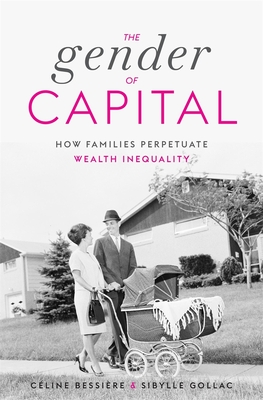The Gender of Capital: How Families Perpetuate Wealth Inequality

The Gender of Capital: How Families Perpetuate Wealth Inequality
Two leading social scientists examine the gender wealth gap in countries with officially egalitarian property law, showing how legal professionals--wittingly and unwittingly--help rich families and men maintain their privilege.
In many countries, property law grants equal rights to men and women. Why, then, do women still accumulate less wealth than men? Combining quantitative, ethnographic, and archival research, The Gender of Capital explains how and why, in every class of society, women are economically disadvantaged with respect to their husbands, fathers, and brothers. The reasons lie with the unfair economic arrangements that play out in divorce proceedings, estate planning, and other crucial situations where law and family life intersect. Céline Bessière and Sibylle Gollac argue that, whatever the law intends, too many outcomes are imprinted with unthought sexism. In private decisions, old habits die hard: families continue to allocate resources disproportionately to benefit boys and men. Meanwhile, the legal profession remains in thrall to assumptions that reinforce gender inequality. Bessière and Gollac marshal a range of economic data documenting these biases. They also examine scores of family histories and interview family members, lawyers, and notaries to identify the accounting tricks that tip the scales in favor of men. Women across the class spectrum--from poor single mothers to MacKenzie Scott, ex-wife of Amazon billionaire Jeff Bezos--can face systematic economic disadvantages in divorce cases. The same is true in matters of inheritance and succession in family-owned businesses. Moreover, these disadvantages perpetuate broader social disparities beyond gender inequality. As Bessière and Gollac make clear, the appropriation of capital by men has helped to secure the rigid hierarchies of contemporary class society itself.PRP: 265.39 Lei
Acesta este Prețul Recomandat de Producător. Prețul de vânzare al produsului este afișat mai jos.
238.85Lei
238.85Lei
265.39 LeiLivrare in 2-4 saptamani
Descrierea produsului
Two leading social scientists examine the gender wealth gap in countries with officially egalitarian property law, showing how legal professionals--wittingly and unwittingly--help rich families and men maintain their privilege.
In many countries, property law grants equal rights to men and women. Why, then, do women still accumulate less wealth than men? Combining quantitative, ethnographic, and archival research, The Gender of Capital explains how and why, in every class of society, women are economically disadvantaged with respect to their husbands, fathers, and brothers. The reasons lie with the unfair economic arrangements that play out in divorce proceedings, estate planning, and other crucial situations where law and family life intersect. Céline Bessière and Sibylle Gollac argue that, whatever the law intends, too many outcomes are imprinted with unthought sexism. In private decisions, old habits die hard: families continue to allocate resources disproportionately to benefit boys and men. Meanwhile, the legal profession remains in thrall to assumptions that reinforce gender inequality. Bessière and Gollac marshal a range of economic data documenting these biases. They also examine scores of family histories and interview family members, lawyers, and notaries to identify the accounting tricks that tip the scales in favor of men. Women across the class spectrum--from poor single mothers to MacKenzie Scott, ex-wife of Amazon billionaire Jeff Bezos--can face systematic economic disadvantages in divorce cases. The same is true in matters of inheritance and succession in family-owned businesses. Moreover, these disadvantages perpetuate broader social disparities beyond gender inequality. As Bessière and Gollac make clear, the appropriation of capital by men has helped to secure the rigid hierarchies of contemporary class society itself.Detaliile produsului











